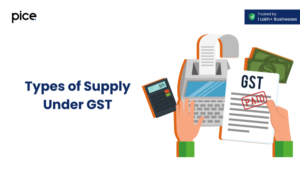Impact of GST on Banks and NBFCs
- 20 Sep 24
- 8 mins

Impact of GST on Banks and NBFCs
Key Takeaways
- GST increased compliance for banks, requiring state-wise registration and more frequent return filings.
- Banking services are taxed at 18%, making services like demand drafts and chequebook issuance more expensive for consumers.
- Certain banking services, such as interest on loans, deposits, and basic savings account services, are exempt from GST.
- GST promotes financial inclusion by exempting key services like RTGS, NEFT, and Jan Dhan account services from tax.
- While GST streamlined taxation, it also increased operational costs for banks due to the need for updated systems and compliance with tax regulations.
Implementing the Goods and Services Tax (GST) has made a significant mark on the Indian economy and its indirect taxation system. The purpose of GST was to subsume various indirect taxes under one head, eliminate the cascading effect of taxation and aim for a unified national market across the country. The impact of GST in the banking sector, along with many other sectors, has been significant.
In this blog, we will walk you through a comprehensive guide on GST on banking services, focusing on its advantages and disadvantages, exemptions and other important aspects.
GST on Banking Services
There has been a significant change in the financial sectors since the implementation of GST. Before the implementation of GST, banks and NBFCs had centralised registration under service tax, regardless of state. Since the implementation, banks have been required to register in each state where they run their operations.
Let us take a look at the key impacts of GST on the banking service sector:
- Increase in Tax Compliance
State-wise registration led to a significant increase in the level of compliance as most banks had 'centralised' registration under the service tax regime. Before GST implementation, banks, as service tax assessee, had to file two returns annually. Under the current tax regime, banks file 61 state-wise annual returns, every year. This includes 5 monthly returns, in addition to one yearly.
- Payment of Applicable GST Rate
Financial services are charged at the rate of 18%, which is 3% higher than the erstwhile tax regime. This high tax rate made demand drafts and chequebook issuance costlier for retail customers. Banks and NBFCs also deal with gold or silver which attracts a concessional GST rate.
💡If you want to pay your GST with Credit Card, then download Pice Business Payment App. Pice is the one stop app for all paying all your business expenses.
How Does GST Work in the Banking Sector?
When it comes to banking, Goods and Services Tax is applicable at every inter-state transaction between bank branches. According to Rule 47 of CGST (Central Goods and Services Tax) Act, 2017, a banking company is liable to issue invoices within 45 days from the banking services’s date of supply to the customers.
One must also note that the place of supply is defined as the ‘location of the recipient of services' as per Section 12(2) of the Integrated GST (Integrated Goods and Services Tax) Act, 2017. In cases where the address of the service recipient is not available, the place of supply of services and the location of the supplier will be the same.
Advantages of GST in Banking
The advantages of implementing GST in the banking sector are many. Let us discuss some of the primary advantages:
- Decreases Compliance Burden: GST is not chargeable on every banking service. This decreases the tax burden on financial institutions and consumers.
- Financial Inclusion: Exemptions of GST from banking services promote financial inclusion in the country. Banking services are provided to customers, irrespective of their income, without any applicable rate of GST on them.
- Benefits to Small Businesses: Small-sized business enterprises and customers with low annual income are benefitted largely from the exemptions provided under the GST regime. This not only decreased the burden of tax but there has also been increase in compliance levels.
Exemptions of GST in Banking
Here are some banking services where Goods and Service Tax is not levied:
- Interest and Deposits: Interests and deposits that a bank earns from its customer’s deposits do not attract GST, i.e., it is exempted.
- Loans and Advances: The interests that are charged on loans given to customers are exempted from GST charges.
- Credit Card Services: The fees charged on credits provided to customers do not attract GST.
- Payment and Settlement Services: Banking services like Real Time Gross Settlement (RTGS), National Electronic Fund Transfer (NEFT) or Immediate Payment Transfer (IMPS) are not GST chargeable.
- Services provided to Basic Saving Bank Deposit (BSBD) Account Holders: Free services provided by a bank or NBFC to its BSBD account holders have GST exemption.
- Services for Jan Dhan Account Holders: The Pradhan Mantri Jan-Dhan Yojana aims to promote financial inclusion across the country. Services provided to Jan Dhan account holders are exempt from GST.
- Services by Banking Correspondents: Services that a banking correspondent or intermediary bank provides to customers do not attract GST.
- Services to Reserve Bank of India (RBI): Banks provide various services to the Reserve Bank of India (RBI), such as settlement services and currency management, which are not subject to GST.
Disadvantages of GST in Banking
In the banking sector, GST has a few drawbacks too. Here are some of them:
- Increased Cost: Banks and NBFCs must stay updated with GST regulations and manage accounting through ESP software. This requires personnel training, which results in increased expenses for financial institutions.
- Penalties from Non-Compliance: To comply with the tax regulations, taxpayers need to file regular GST returns in addition to regular maintenance of financial records. If you fail to adhere to these, you may have to incur hefty penalties for non-compliance.
The Bottom Line
The introduction of GST has brought significant changes to the banking sector, making it essential for both customers and financial institutions to stay up-to-date on the latest GST updates. A key impact of GST in the banking sector is the increased frequency of annual return filing, with banks now submitting 61 state-wise returns compared to the previous 2 annual returns.
 By
By 

















